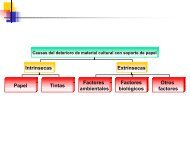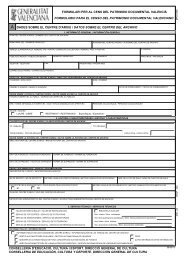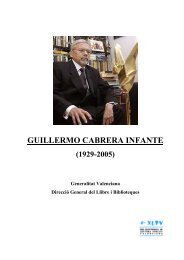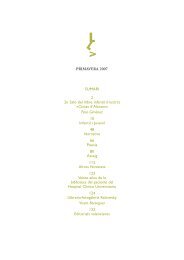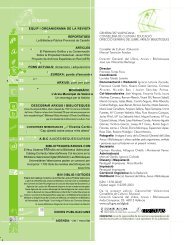Listening to the Past, Speaking to the Future
Listening to the Past, Speaking to the Future
Listening to the Past, Speaking to the Future
- No tags were found...
You also want an ePaper? Increase the reach of your titles
YUMPU automatically turns print PDFs into web optimized ePapers that Google loves.
Developing Archives and Audiencescreate an unappealing impression, and often offer poorfacilities for effective stewardship of collections. Whilstrecognising <strong>the</strong> significant investment made by some localauthorities in archives over <strong>the</strong> past ten years (for example<strong>the</strong> recent Essex Record Office), current levels of supportby those responsible for managing local services must bemaintained. An overall uplift in core funding wouldradically transform UK archives. As an aspirational goal,capital investment in <strong>the</strong> order of £30–£50 million forupgrades of premises over <strong>the</strong> next five <strong>to</strong> ten years wouldrevitalise archives for all.Increasingly, new archive buildings, may be funded bygrant support from <strong>the</strong> Heritage Lottery Fund or by localauthorities. Many have been developed in partnership witho<strong>the</strong>r public services such as museums, exhibition spaces,cafes and meeting rooms. The locations of <strong>the</strong>se centresare acting as a catalyst for renewal in areas of regenerationand can provide opportunities for employment, trainingand learning for local people. Good examples include <strong>the</strong>Surrey His<strong>to</strong>ry Centre, Norfolk Record Office (and <strong>the</strong> EastAnglian Film Archive), The Women’s Library and <strong>the</strong>Yorkshire Film Archive (sharing accommodation with TheCollege of York St. John, a higher education learningcentre). The 2001 Survey of Visi<strong>to</strong>rs <strong>to</strong> British Archives by<strong>the</strong> Public Services Quality Group found that for 87% ofusers, visiting <strong>the</strong> archive was <strong>the</strong>ir main purpose forvisiting an area, and while <strong>the</strong>re 29% ate out locally, 36%used local shops and services and 18% visited o<strong>the</strong>rplaces of interest, supporting local economic growth.Developing IT TrainingIT training opportunities at Glasgow University Archives Service arehelping unemployed people back in<strong>to</strong> workDriving Licence) training. By creating work placements forstudents who have completed <strong>the</strong>ir ECDL course, GUASprovides a career stepping-s<strong>to</strong>ne from basic IT training <strong>to</strong>archives work.So far, through 15 work placements, <strong>the</strong> scheme has led<strong>to</strong> three graduates becoming archivists. Angie Thomsoncomments, “The GUAS placement has allowed me <strong>to</strong>change my career path in a direction that I knew I wanted<strong>to</strong> go but could not see how <strong>to</strong> get <strong>the</strong>re.”The scheme also benefits GUAS by bringing new talentin<strong>to</strong> <strong>the</strong> archives services. Says Direc<strong>to</strong>r of GUAS, LesleyRichmond, “We can provide <strong>the</strong> training and experiencethat people require <strong>to</strong> apply for professional trainingopportunities, while <strong>the</strong> archives profession gains newrecruits who bring ‘real’ experience of record creation andmanagement.”37Over <strong>the</strong> last 25 years, Glasgow University ArchiveServices (GUAS) has been involved with variousgovernment-funded initiatives <strong>to</strong> provide a range of ITtraining opportunities. These have largely been aimed atlocal unemployed people, including university graduates,who can benefit from new skills learned in a workplaceenvironment.A recent development centres on <strong>the</strong> University ofGlasgow’s in-house Universal Training Solutions team,which provides facilities for ECDL (European ComputerTourismAs <strong>the</strong> UK’s sixth largest industry, <strong>to</strong>urism is a crucialcomponent of <strong>the</strong> country’s economy. VisitBritain, <strong>the</strong>organisation that markets Britain <strong>to</strong> <strong>the</strong> rest of <strong>the</strong> world,estimates that <strong>the</strong> volume of inbound <strong>to</strong>urism will increaseby 3.3 per cent in 2004, taking <strong>the</strong> <strong>to</strong>tal number of visi<strong>to</strong>rs<strong>to</strong> 25.5 million. The value of inbound <strong>to</strong>urism is forecast <strong>to</strong>grow in 2004 <strong>to</strong> £12.3 billion.







